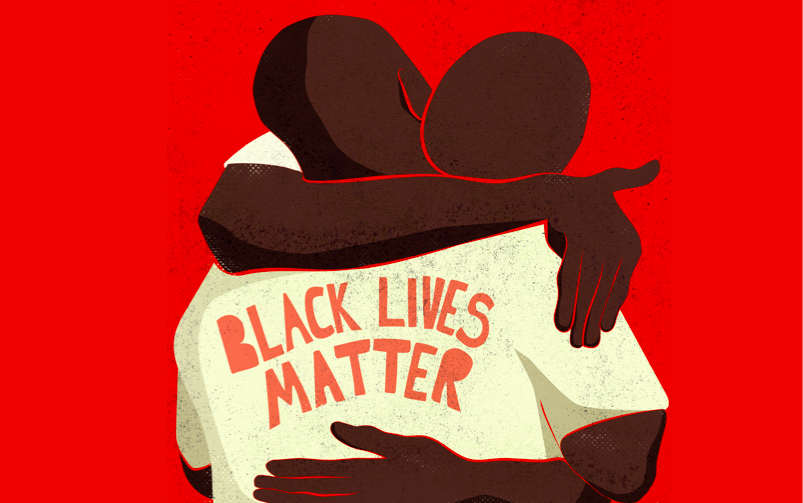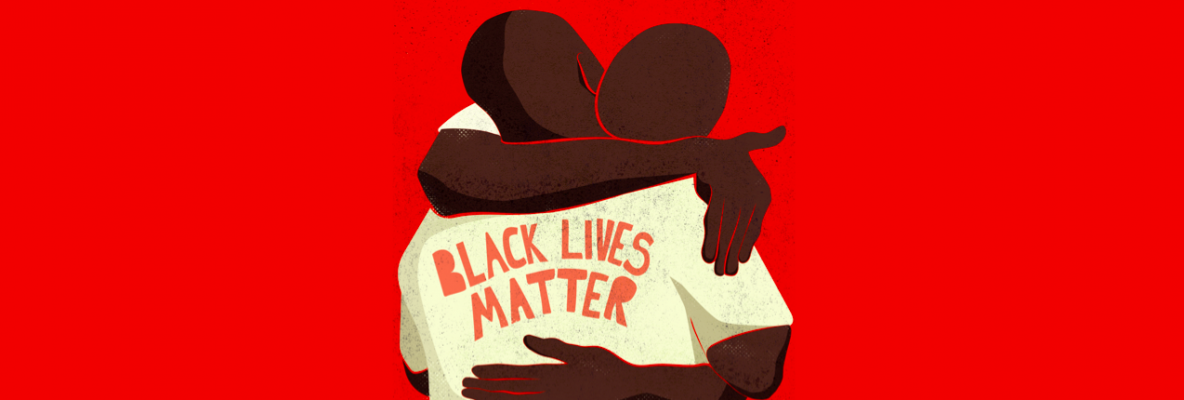BLACK LIVES STILL MATTER
The power of the movement and why we can't slow down now
By Lara Bodger / 22 July 2020

Illustration by Sabi Newman
The death of George Floyd, the unarmed black man who died after a white police officer knelt on his neck for almost nine minutes, has sparked global protests against racism, police brutality, and injustice.
International protestors have marched in solidarity with the US, but have also drawn attention to discrimination and police brutality in their specific country contexts. These diverse crowds of protestors worldwide gives reason to believe that people are finally waking up to the very real existence of racism and are willing to act to demand justice. Black Lives Matter has been the unifying message behind all of these protests.
Rayshard Brooks, Breonna Taylor and Ahmaud Arbery, are other tragic examples of Black US citizens who posed no threat to police yet lost their lives. There are also countless other historic and recent deaths that have not made the headlines. In the US, Black people are 3x more likely to be killed by police than white people. In the UK, Black people are 8x more likely to be stopped and searched and to have force used against them and account for 8% of deaths in police custody despite making up 3% of the population.
Black Lives Matter (BLM) was formed in 2013, after Trayvon Martin, an unarmed Black teenager was killed by neighbourhood watchman George Zimmerman.
BLM has continued to organise for victims of police brutality, advancing the legacy of the civil rights movement. BLM is also sometimes referred to as The Movement For Black Lives and can be used to denote a broader network of Black liberation organisations. The movement was started by three Black women, Patrisse Khan-Cullors, Alicia Garza and Opal Tometi, seeking to centre the voices of women, queer and transgender people, as opposed to the voices of heterosexual, cisgender men that have traditionally led social movements. Aside from the many powerful protests organised by BLM over the years, the group organises through local chapters, so that problems facing Black communities can be addressed in specific and relevant interventions by local leaders and members.
Much of the power of the Black liberation movement lies in its ability to effectively mobilise social media. Since its first usage in 2013, #BlackLivesMatter has been used 47.8 million times on Twitter and in 2015, The American Dialect Society declared #Blacklivesmatter its word of the year. The bystander videos of police killings posted online and shared through social media platforms are often the catalyst for perpetrators to be brought to justice. The video of the killing of Ahmaud Arbery by Gregory and Travis McMichael led to the reopening of the case, after two months of inaction from prosecutors. It should be noted that these videos are graphic and traumatising, with many questioning the necessity of the dissemination of such content.
Since Floyd’s death, support for Black Lives Matter has increased, to a majority of the US public now in support of protests, in stark contrast to when the movement started. Unlikely support has come from former presidential candidate Mitt Romney, who tweeted his support before joining a BLM march, the first known Republican senator to do so. The movement is having an impact across all facets of society, with corporations such as Facebook and Netflix pledging their support for BLM, and Facebook donating $10 million to affiliated groups. In the UK, television shows depicting blackface, such as Little Britain, have been removed from streaming sites. In the US, the National Football League has performed a U-turn, declaring that Black Lives do Matter after they failed to support Colin Kaepernick and other players who took the knee to protest racial inequality and police brutality in 2014. Statues linked to individuals who have benefitted from slavery and colonialism have been torn down in the UK, such as Edward Colston in Bristol, and in the US statues linked to Confederate leaders have also been removed.
In the wake of Floyd’s murder in Minneapolis, the police department will be defunded, replaced with a community-based system to ensure public safety. A proposal that BLM and organisations such as Reclaim The Block have long been making. Cities such as New York and Los Angeles have also announced steps to reform and to reduce police budgets, with Los Angeles mayor Eric Garcetti announcing that its police department will be defunded by $250 million. The House of Representatives has passed the ‘George Floyd Justice in Policing Act’, which bans the use of chokeholds, ends racial profiling and establishes a registry for police misconduct. Public pressure for justice for victims of police brutality has resulted in: Derek Chauvin being charged with second-degree murder for George Floyd’s death, Ahmaud Arbery's killers being indicted on murder charges and the officer who shot Rayshard Brooks is facing 11 charges including murder. In Kentucky, Breonna’s Law has been passed to ban no-knock warrants, after Breonna was shot 8 times by police who raided her house in a case of mistaken identity.
At George Floyd’s funeral, veteran civil rights activist William Lawson spoke of the presence of White, Asian and Hispanic protestors at recent marches, which contrasted to his experience in the civil rights movement, marching with only Black people.
This sentiment was echoed by Angela Davis, the Black liberation activist and scholar, who views the current movement of protest as a great opportunity, building on centuries of work that have attempted to expel racism. This growth of the movement to incorporate newfound allies has re-energised global calls to end racism. It is essential that those pledging support continue to practise what they preach once the BLM movement is no longer in the headlines. The movement has not been without a backlash, with white nationalists in the UK organising counter-protests to protect statues - attacking police in the process. In the US, Trump threatened protestors with military intervention and tweeted “when the looting starts the shooting starts”, glorifying police violence. This backlash should not take away from the major changes that have occurred since the recent protests, with previously unthinkable policy changes such as the defunding of a police department coming into force.
The mainstream hype for #BlackLivesMatter is waning, as Instagram feeds resume to picnics with friends and puppies, but there is much more to be done. Here are some ways you can help to keep up the movement, to make sure it doesn't just stay as a 'moment':
- Continue to educate yourself on matters of racial injustice (particularly non-black folx).
- Educate others (yes, that means having those heated arguments with your racist uncle at the family BBQ). Continue to share information on social media.
- Call out injustice when you see it: workplace discrimination ? lack of real representation ? microaggressions? Don't evade the responsibility to call these out.
- Continue to sign petitions and donate to worthy causes - find a list of some here.
- Write to your local MP and demand change.
Further resources on how to help can be found here.
If the energy that it begun with could continue its momentum, there’s no end to what can be achieved.
Art by
Words by
Share this article

